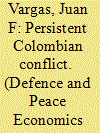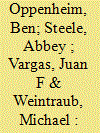| Srl | Item |
| 1 |
ID:
110181


|
|
|
| 2 |
ID:
110186


|
|
|
|
|
| Publication |
2012.
|
| Summary/Abstract |
Focusing on the Colombian armed conflict, this paper develops for the first time a within-country analysis of violence duration. It examines a wide range of factors potentially associated with violence duration at the municipal level for the period 1988-2004, including geographic factors, economic and social variables, institutional characteristics, victimization variables and government intervention. It individuates the most robust correlates of the persistence of localized conflict, both across specifications and using different econometric models of duration analysis. Results suggest that violence in Colombia is more persistent in places where illegal rents are available. Better quality institutions and a more active military are in turn associated with shorter conflict episodes.
|
|
|
|
|
|
|
|
|
|
|
|
|
|
|
|
| 3 |
ID:
107556


|
|
|
|
|
| Publication |
2011.
|
| Summary/Abstract |
I develop a dynamic model of social conflict whereby manifest grievances of the poor generate the incentive of taking over political power violently. Rebellion can be an equilibrium outcome depending on the level of preexisting inequality between the poor and the ruling elite, the relative military capabilities of the two groups and the destructiveness of conflict. Once a technology of repression is introduced, widespread fear reduces the parameter space for which rebellion is an equilibrium outcome. However, I show that repression-driven peace comes at a cost as it produces a welfare loss to society.
|
|
|
|
|
|
|
|
|
|
|
|
|
|
|
|
| 4 |
ID:
110185


|
|
|
|
|
| Publication |
2012.
|
| Summary/Abstract |
We study the causal effect of recent landmark events of the Colombian armed conflict on the foreign perception of sovereign risk, as measured by the price of the Credit Default Swap (CDS) of Colombian bonds. We construct a Synthetic Control Group to use as the non-conflict counterfactual of the Colombian CDS price and compare its behavior around relevant conflict-event dates with that of the actual (conflict-affected) Colombian CDS. Results suggest that the impact of conflict on the foreign perception of sovereign risk is sizable but rather idiosyncratic, and depends on the political context surrounding each event.
|
|
|
|
|
|
|
|
|
|
|
|
|
|
|
|
| 5 |
ID:
141181


|
|
|
|
|
| Summary/Abstract |
Anti-insurgent militias and states attempt to erode insurgent groups’ capacities and co-opt insurgent fighters by promising and providing benefits. They do so to create a perception that the insurgency is unraveling and to harness inside information to prosecute more effective counterinsurgency campaigns. Why do some insurgents defect to a paramilitary group and others exit the war by demobilizing, while still others remain loyal to their group? This article presents the first empirical analysis of these questions, connecting insurgents’ motivations for joining, wartime experiences, and organizational behavior with decisions to defect. A survey of ex-combatants in Colombia shows that individuals who joined for ideological reasons are less likely to defect overall but more likely to side-switch or demobilize when their group deviates from its ideological precepts. Among fighters who joined for economic reasons, political indoctrination works to decrease their chances of demobilization and defection to paramilitaries, while opportunities for looting decrease economically motivated combatants’ odds of defection.
|
|
|
|
|
|
|
|
|
|
|
|
|
|
|
|